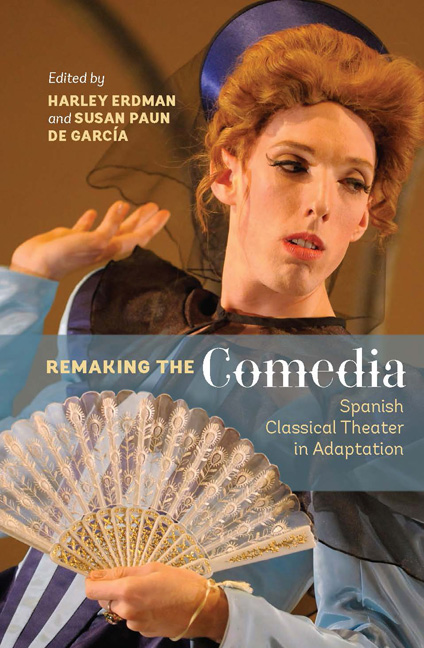Book contents
- Frontmatter
- Contents
- Illustrations
- Contributors
- Preface
- Note to the Reader
- Acknowledgements
- PART I THEORIZING
- PART II SURVEYING
- PART III SPOTLIGHTING
- PART IV SHIFTING
- 21 Porous Boundaries: novela or comedia?
- 22 Lope de Vega and Lenfilm: The Dog in the Manger's Cross-Cultural Journey
- 23 Classical Theater and Puppetry: La Máquina Real
- 24 Remaking Moreto's El desdén con el desdén: From Author's Text to Director's Text
- 25 Lope's Peribáñez on the Lyric Stage
- 26 A Musical Marta
- Play Titles Cited
- Works Cited
- Index
25 - Lope's Peribáñez on the Lyric Stage
from PART IV - SHIFTING
Published online by Cambridge University Press: 05 December 2015
- Frontmatter
- Contents
- Illustrations
- Contributors
- Preface
- Note to the Reader
- Acknowledgements
- PART I THEORIZING
- PART II SURVEYING
- PART III SPOTLIGHTING
- PART IV SHIFTING
- 21 Porous Boundaries: novela or comedia?
- 22 Lope de Vega and Lenfilm: The Dog in the Manger's Cross-Cultural Journey
- 23 Classical Theater and Puppetry: La Máquina Real
- 24 Remaking Moreto's El desdén con el desdén: From Author's Text to Director's Text
- 25 Lope's Peribáñez on the Lyric Stage
- 26 A Musical Marta
- Play Titles Cited
- Works Cited
- Index
Summary
Among students of European drama it is more or less generally known that a number of Spanish plays of the first half of the nineteenth century were later fashioned into operas. Some of these transformations resulted in works that remain popular and admired today, notably Verdi's La forza del destino, based on a play by the duque de Rivas, and the same composer's Il trovatore and Simon Boccanegra, both based on plays by Antonio García Gutiérrez. Much less known is the fact that several Golden Age comedias also had a second life on the lyric stage, although, with a few exceptions, they were reborn not as operas but rather as zarzuelas. It is difficult, of course, to establish a strict separation between these two types of musical theatre, but a distinction frequently made is that operas tend to be sung-through, whereas zarzuelas, like operettas and musical comedies, alternate sung passages with those that are spoken. Typically, although not always, they are light in tone, which means that comic characters and scenes abound in them. Also common are scenes involving dancing and spectacle.
The history of the zarzuela is normally divided into two halves, the classical and the modern. Classical zarzuelas are those that were composed in the last decades of the seventeenth century and first decades of the eighteenth. Modern zarzuelas are those that come from the second half of the nineteenth century and the first half of the twentieth. Classical zarzuelas slipped into oblivion in Spain after their peak of prestige in the early eighteenth century, but in recent years they have been increasingly recorded and occasionally produced as well. The best of the modern zarzuelas have never lost their audience, and are still today often found on the stages of Spain and other countries in the Hispanic world.
One of the most popular of these, if not the most popular of all, is Doña Francisquita, based on lope de Vega's comedy La discreta enamorada. Beloved for its gaiety, freshness, and charm, Doña Francisquita premiered in 1923.
- Type
- Chapter
- Information
- Remaking the ComediaSpanish Classical Theater in Adaptation, pp. 245 - 254Publisher: Boydell & BrewerPrint publication year: 2015



